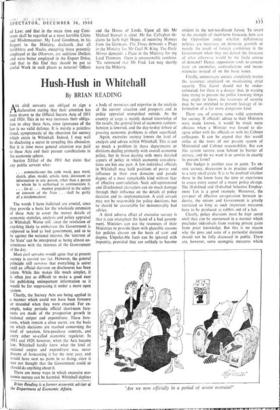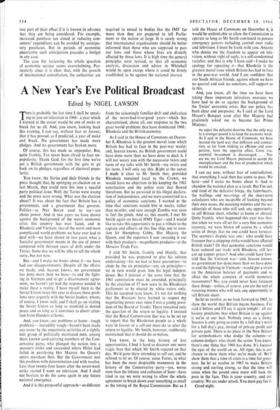Hush-Hush in Whitehall
By BRIAN READING
Section 2(1)(a) of the 1911 Act states that any public servant who:
. communicates the code word, pass word, sketch, plan, model, article, note, document or information to any person, other than a person to whom he is authorised to communicate it, . . . (in a) . . . manner prejudicial to the safety or interests of the State . . . shall be guilty of a misdemeanour.
The words I have. italicised are crucial, since they provide a basis for the wholesale extension of these Acts to cover the merest details of economic statistics, analysis and policy appraisal in Whitehall. Worse still, since the revelation of anything likely to embarrass the Government is supposed to lead to bad government, and so to be against the national interest, the 'interests of the State' can be interpreted as being almost co- terminous with the interests of the Government of the day.
Most civil servants would agree that at present secrecy is carried too far. However, the general principle still survives that everything is secret until an official decision on disclosures has been taken. While this makes life much simpler, it is often just as difficult to make a good case for . publishing unimportant information as it would be for suppressing it under a more open system.
Clearly, the Secrecy Acts are being applied in a manner which could not have been foreseen or intended when they were enacted. For ex- ample, today periodic official short-term fore- casts are made of the prospective growth in national output and expenditure. _These fore, casts, which remain a close secret, are the basis on which decisions are reached concerning the level of taxation, hire-purchase controls, and every other so-called economic regulator. In 1911 and 1920, however, when the Acts became law, Whitehall hardly knew what the level of national output and expenditure was, never dreamt of forecasting it for the next year, and would have seen no point in so doing, since it was not thought that the Government could or should do anything about it.
There are many ways in which excessive eco- nomic secrecy can be harmful. Whitehall.deploys Brian Reading is a farmer economic adviser at the Department of Economic Affairs. a body of resources and expertise in the analysis of the current situation and prospects and in policy appraisal unmatched outside. As the country at large is mainly denied knowledge of the results, the general level of economic compre- hension is lowered, and the day-to-day debate of pressing economic problems is often superficial.
Again, excessive secrecy lowers the level of analysis and advice within Whitehall. This is not so much a problem in those departments or divisions dealing primarily with overall economic policy, but in those dealing with more detailed aspects of policy in which economic considera- tions are but one part. A few individual officials in Whitehall may hold positions of power and influence in their own domains and parade dogma of a most remarkable kind without fear of effective contradiction. Such self-opinionated and ill-informed characters can do much damage through their influence on the details of policy decision and its implementation. A civil servant may not be responsible for policy decisions, but he should be answerable for demonstrably bad advice.
A third adverse effect of excessive secrecy is that it can strengthen the hand of a bad govern- ment. Ministers can use the resources of their Ministries to provide them with plausible reasons for policies chosen on the basis of cant and dogma. Unpalatable facts can be ignored with impunity, provided they are unlikely to become evident in the not-too-distant future. To revert to the example of short-term forecasts, how can the Opposition judge whether deflationary policies are necessary on domestic grounds or merely the result of foreign confidence in the Government when they are denied the forecasts of what otherwise would be the likely course of demand? Hence, opposition tends to concen- trate on anomalies, contradictions and incon- sistencies instead of on the basic issues.
Finally, unnecessary secrecy completely wastes the resources employed on maintaining strict security. This factor should not be under- estimated, for there is a danger that, in wasting time trying to prevent the public knowing things they ought to know, the resources of security may be too stretched to prevent leakage of in- formation of a far more dangerous kind.
There are, of course, some valid arguments for secrecy. If officials' advice to their Ministers were made known, it would be much more obvious when a Minister was forced to dis- agree either with his officials or with his Cabinet colleagues. It can be argued that this would strike at the roots of our present system of Ministerial and Cabinet responsibility. But can this system survive even behind its barrier of secrecy, and do we want it to survive in exactly its present form?
The budget is another case in point. To en- sure secrecy, discussion is in practice confined to a very small circle. It is to be doubted.whether those in the know have the time or experience to assess every aspect of a major policy change. The ill-defined and ill-drafted Selective Employ- ment Tax is a good example. Moreover, the prospect of effective co-operation between in- dustry, the unions and Government is greatly restricted so long as such important measures have to be produced as rabbits out of a hat.
Clearly, policy decisions must be kept secret until they can be announced in a manner which precludes individuals from making private gains from prior knowledge. But this is no reason why the pros and cons of a particular decision should not be fully discussed in public. There are, however, some economic measures which 'Are we now officially in a period of severe restraint?'
lose part of their effect if it is known in advance that they are being considered. For example, increased purchase tax aimed at reducing con- sumers' expenditure can be avoided by anticipa- tory purchases. But in periods of economic uncertainty such anticipation precedes a budget in any case.
The case for reviewing the whole question of economic secrecy seems overwhelming. Par- ticularly since it is clear that, with the growth of international consultation, the authorities are required to reveal to bodies like the IMF far more than they are prepared to tell Parlia- ment or the nation at large. It is surely wrong that international organisations should be better informed than those who are supposed to pass our laws and those whose lives are directly affected by those laws. It is high time the general principles were revised, so that all economic analysis, discussion and advice in Whitehall would be open except where it could be firmly established to be against the national interest.







































 Previous page
Previous page